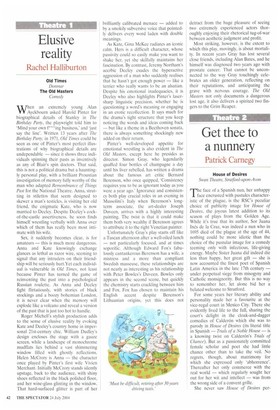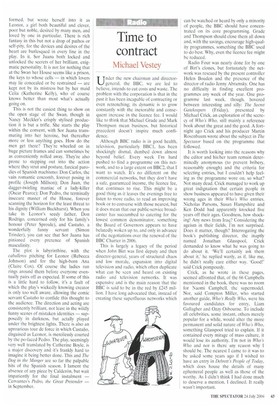Get thee to a nunnery
Patrick Carnegy
House of Desires Swan Theatre, Stratford-upon-Avon
The face of a Spanish nun, her unhappy face encrusted with pustules characteristic of the plague, is the RSC's peculiar choice of publicity image for House of Desires, the joyous latest addition to its season of plays from the Golden Age. While it's true that its author, Sor Juana Ines de la Cruz, was indeed a nun who in 1695 died of the plague at the age of 44, nothing could be more idiotic than the choice of the pustular image for a comedy teeming only with infectious, life-giving energy. Maybe Sister Juana did indeed die less than happy, her great gift — she is now accounted the finest poet of Spanish Latin America in the late 17th century — under perpetual siege from misogyny and Catholic monsignority. But this is no way to remember her, let alone bid her a belated welcome to Stratford.
For some years her literary ability and personality made her a favourite at the vice-regal court in Mexico City. There she evidently lived life to the full, sharing the court's delight in the cloak-and-dagger comedies of Calderon which she was to parody in House of Desires (its literal title in Spanish — Trials of a Noble House — is a knowing twist on Calderon's Trials of Chance). But as a passionately committed female scholar and poet she had little chance other than to take the veil. No regrets, though, about matrimony for which she expressed only 'abhorrence'. Thereafter her only commerce with the real world — which regularly sought her out for her wit and intellect — was from the wrong side of a convent grille.
She never saw House of Desires per
formed, but wrote herself into it as Leonor, a girl both beautiful and clever, poor but noble, desired by many men, and loved by one in particular. There is rich fantasy in this but not a drop of pathos or self-pity, for the devices and desires of the heart are burlesqued in every line in the play. In it. Sor Juana both locked and unlocked the secrets of her brilliant, enigmatic personality. It is not for nothing that at the Swan her House seems like a prison, the keys to whose cells — in which lovers may lie concealed or be restrained — are kept not by its mistress but by her maid Celia (Katherine Kelly), who of course knows better than most what's actually going on.
This is not the easiest thing to show on the open stage of the Swan, though in Nancy Meekler's crisply stylised production it is but a trifle. She starts the play within the convent, with Sor Juana transmuting into her heroine, but thereafter more or less anything goes. How do the men get there? They're wheeled on in huge picture frames and can sometimes be as conveniently rolled away. They're also prone to stepping out into the action where they strut and posture, farcical parodies of Spanish machismo: Don Carlos, the vain romantic coxcomb, forever posing in profile (Joseph Millson); Don Juan, the dagger-twirling maniac of a lady-killer (Oscar Pearce); Don Pedro, the terminally insecure master of the House, forever scanning the horizon for the least threat to his dignity (William Buckhurst). When you take in Leonor's seedy father, Don Rodrigo, concerned only for his family's honour (Peter Sproule), and Castano, a wonderfully funny servant (Simon Trinder), you can see that Sor Juana has pinioned every pretence of Spanish masculinity.
The plot is labyrinthine, with the caballeros pitching for Leonor (Rebecca Johnson) and for the high-born Arta (Claire Cox). Of course the ladies run rings around them before everyone eventually pairs off as expected. If some of this is a little hard to follow, it's a fault of which the play's wickedly knowing creator is only too well aware, allowing the comic servant Castoff° to confide this thought to the audience. The direction and acting are consistently brilliant, not least in the wildly funny scenes of mistaken identities — supposedly in darkness, but actally played under the brightest lights. There is also an uproarious tour de force in which Castoff°, disguised as Leonor, is mercilessly courted by the po-faced Pedro. The play, seemingly very well translated by Catherine Boyle, is a major discovery' and it's frankly hard to imagine it being better done. This and The Dog in the Manger are so far the palpable hits of the Spanish season. I lament the absence of any piece by Calderon, but wait impatiently for the final instalment — Cervantes's Pedro, the Great Pretender — in September.



























































 Previous page
Previous page